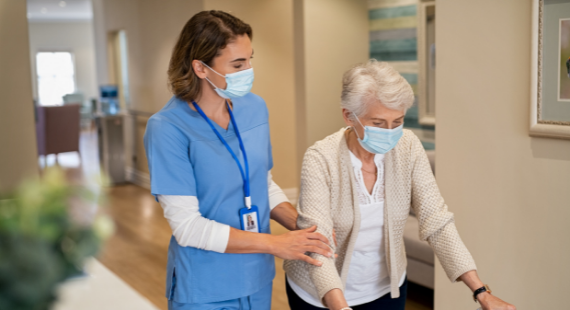
Phase two of the COWORKER Nursing Home Study reveals that the mental health of staff working in nursing homes was further impacted as COVID-19 pandemic restrictions eased.
The COWORKER Nursing Home Study is a a research study from St Patrick’s Mental Health Services (SPMHS); Trinity College Dublin (TCD); the Royal College of Surgeons Ireland; and Nursing Homes Ireland.
Phase two of the study explored the mental health of nursing home staff during the COVID-19 pandemic. Findings from this second phase reveal a further decline in the mental health of staff working in nursing homes across Ireland which coincided with the easing of public health restrictions.
The COWORKER Nursing Home Study is led by Professor Declan McLoughlin, Consultant Psychiatrist here in SPMHS and Research Professor of Psychiatry at TCD. It was developed to investigate the mental health impact of the pandemic on nursing home staff, identifying mental health needs of both clinical and non-clinical nursing home staff and helping to inform appropriate responses.
The phase two findings were gathered through a national anonymous survey of nursing home staff in early 2022. This followed a previous national anonymous survey carried out at the beginning of 2021, during the height of the pandemic. Phase two research started at the beginning of 2022, when hospitalisation rates were declining, most staff were vaccinated, and restrictions were being eased.
The follow-on findings from the peer-reviewed study showed that nursing home staff working after Ireland’s pandemic restrictions had been lifted reported substantially higher levels of post-traumatic stress (PTSD), moral injury, low mood, and suicidal thinking than during the pandemic.
Moral injury is the psychological distress that a person experiences when they feel betrayed by higher authorities or are forced to witness or perform an act which goes against their deeply-held personal beliefs. The concept of moral injury was originally developed in reference to soldiers in combat situations. However, it has interested researchers during the COVID-19 pandemic, when healthcare workers had to make difficult decisions, such as allocating care or implementing visiting restrictions.
Research from the follow-on study showed:
- 65% of respondents reported moderate or severe symptoms of post-traumatic stress
- 57% of nursing home staff reported low mood in the second phase of the research.
Researchers also found levels of suicidal thinking increased. At the time of the first survey, one in seven staff reported thinking of ending their life over the past week; this increased to one in six by the time of the second survey. Earlier in the pandemic, one in 11 staff reported planning to end their life; during phase two of the study in 2022, one in seven staff reported planning to end their lives in the past week.
Staff also reported more concerns about the stigma associated with working in their jobs, more stress, and concerns about infection control processes.
Professor Declan McLoughlin, explains: “Despite the easing of public health restrictions and the widespread roll-out of vaccinations among staff and residents of nursing homes, findings from phase two of the COWORKER study show that the mental health effects of COVID-19 are ongoing and require continued monitoring to inform appropriate responses. Through the publication of these findings, it is hoped that key areas of concern for nursing home staff’s mental health can be highlighted and addressed as required, and we would encourage any nursing home staff who are experiencing mental health difficulties following the pandemic to seek support as needed.”
With the research highlighting high levels of low mood (57%), suicidal ideation (18%) and suicidal planning (15%), lead author of the study, Dr Conan Brady, emphasizes the importance of providing support to people working in the nursing home sector.
Dr Brady says: “Findings from the COWORKER study emphasise the scale of the mental health impacts of COVID-19 on nursing home staff and identify some key areas where staff may require support, such as for PTSD and moral injury. The nursing home sector is one that will become more and more critical as our population ages. Like many areas of the healthcare sector, it is vital that we ensure that the mental health of staff working in nursing homes is supported.”
The results of phase two of the peer-review study were published in PLOS ONE in late September. You can read the phase two findings here.

